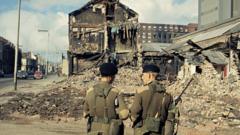22 minutes ago
About sharing
The High Court in Belfast is issuing a ruling on whether the government’s controversial Troubles Act is lawful.
The case has been brought by relatives of victims and the survivor of a shooting.
The act involves a conditional amnesty for suspects and introduces a ban on inquests and future civil actions related to the Troubles era.
The government has argued its act is human rights compliant.
However, those bringing the action disagree.
They claim the legislation is unconstitutional and breaches Articles 2 and 3 of the European Convention on Human Rights.
The 200-page judgement is being delivered on Wednesday.
Mr Justice Colton reserved judgment last November after listening to eight days of argument.
Legal experts have speculated the challenge could take several years to exhaust, as it could be appealed all the way to the Supreme Court.
Separately, the Irish government is also taking a case against the UK at the European Court in Strasbourg.
The Belfast case was brought by Martina Dillon, John McEvoy, Lynda McManus and Brigid Hughes.
Ms Dillon’s 45-year-old husband, Seamus, was shot dead in a loyalist attack at the Glengannon Hotel in Dungannon, County Tyrone, in 1997.
Mr McEvoy survived a loyalist shooting on the Thierafurth Inn in Kilcoo, County Down, in 1992.
Ms McManus’s father, James, was among those wounded in the Sean Graham bookmakers massacre earlier the same year.
Ms Hughes’s husband, Anthony, was an innocent man killed as he drove into the SAS ambush of an IRA unit in Loughgall in 1987.
Amnesty International has supported their action.
What is the Northern Ireland Troubles Act?
The act, which came into effect in September, will end future civil litigation and inquests into deaths which occurred during more than 30 years of violence in Northern, known as the Troubles.
The government has said the legislation, which applies to all former members of the security forces and ex-paramilitaries, is an attempt to draw a line under the events of the past.
It has repeatedly stated the new act is, in its view, human rights compliant.
Prosecutions that are currently ongoing will continue to conclusion. However, any inquests that have begun will end in May unless they have reached the point of delivering findings.
It is also likely to limit investigations, which from now on would be undertaken by the Independent Commission for Reconciliation and Information Recovery (ICRIR).
Opponents, which include victims’ groups and all political parties in Northern Ireland, have argued it will remove access to justice.
A number of legal challenges to it have been brought by victims’ groups and families of people who were killed or injured during the Troubles.
Related Topics
21 November 2023
